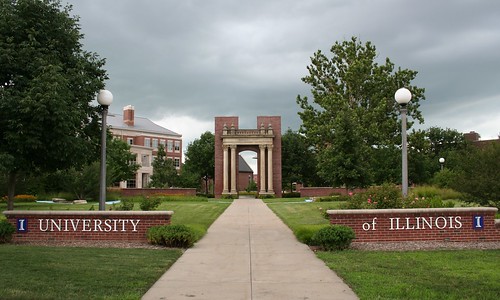On-Campus Jobs for College Students – It’s Not All About Money
To get the most from your college experience, consider spending some time working on campus.
Ironically, most students who seek campus employment do so because of the desire to help fund their education. Yet, talking with two student bloggers, Amelia Possanza (2012) of Swarthmore College, and Yuri Ozeki (2009) from the University of Illinois, working on campus is an integral part of their overall college experience.
On Campus Employment
Amelia Possanza, a freshman at Swarthmore College, found the perfect work opportunity for her at the school’s performing arts center. Having done a great deal of technical theater work for fun in high school, Possanza utilized her prior experiences to secure a regular position at Swarthmore as a scene shop foreman.
The native of Pittsburgh has kept her hours to a minimum in the early going, especially given her involvement in athletics as a member of the swim team. In her first semester, Possanza does two shifts of two hours each week.
As for budgeting her time, Possanza learned in high school that doing school work for hours on end never really got her anywhere. “What works for me,” explains Possanza, “is studying for awhile and then doing some physical activity that allows my mind to mull over the concepts and sub-consciously work stuff out.”

The freshman minoring in Latin American Studies loves the physical nature of working and building sets. “Cutting wood and putting in screws gives me an opportunity to do something with my hands and take a break from mental exertion.”
Possanza also is quick to point out that she has learned a great deal from her work experiences, teachings that she might not otherwise receive in the classroom.
“Technical theater is all about problem solving, especially problem solving for problems that no one has ever encountered before,” she notes. “How can we make this plastic well look real? What can we attach to this metal bar to make it longer?”
“I love it because there is no right answer, only a method to approaching such problems.” As for gaining additional skills, Possanza adds, “I’m obtaining practical skills, such as saw use and drafting, that could help me get a transitional job in the future.”
Yuri Ozeki of the University of Illinois manages to hold down three on-campus jobs simultaneously. The senior works anywhere from 25-30 hours a week with a chunk of that time coming on weekends.
The bulk of Ozeki’s work hours come as a facility manager at the Urbana-Champaign’s Division of Campus Recreation. Her two older sisters worked at the facility when they attended Illinois and encouraged their younger sibling to consider it as well.
My campus recreation job is very flexible,” states the 22-year-old. “I work with other facility managers to create a work schedule that we are all happy with. Typically, I have two morning shifts during the work week, then, I try to pick up two weekend shifts.”
In addition to the 10 or 12 hours she spends each week at her campus recreation employment, the News-editorial journalism major puts in time as a writing intern at the University’s Office of Admissions. Though she has a relatively routine schedule, working four hours each Monday, Wednesday, and Friday, she acknowledges that the office has been very willing to recognize how important her education is to her.
“Some weeks, I have two or three class projects due,” the senior notes, “so I won’t work as much but then the next week, I’ll try to be in for longer shifts three times a week.”
To further her writing skills, Ozeki also took a copy-editing position at the campus newspaper, The Daily Illini. As a freshman, she also served as a reporter for the paper. “I work once a week and attend occasional meetings and training sessions,” she explains.
But while school is definitely her primary responsibility, Ozeki, like Possanza, insists that her work experience is rounding out her college education very nicely.
“My various jobs are really contributing to my education just as my classroom work is, so I see it as time well spent. When I’m working, I don’t necessary see it as ‘working’ or see it as something removed from my purpose of being in college: my education.”
Additional Peer Group
In addition to the overall work experience, each setting provides students another set of individuals to become acquainted with. Possanza acknowledges that her work in the theater does not bring her in contact with many classmates.
“I don’t work with many other students,” explains the Swarthmore freshman. “But the full-time technical theater crew that I work with is full of fairly young people who constantly teach me about new music. They also had very different college experiences than I did.”
“I have also met a few part-time people who are trying to start a career in technical theater, so they take on whatever jobs they can get. It’s so interesting to talk to people who are out in the ‘real world,’ especially since college can be such a bubble.”
For Ozeki, her work at the Daily Illini brings her into contact with fellow journalism majors. She notes, “It’s important to have a support network of people who are going through the same experiences.”
But she also quickly adds that her work at the Office of Admissions and Campus Recreation brings her into contact with people from many different fields. “Working with people who have different perspectives and ideas only help me to widen my skill sets and viewpoints,” she insists.
“At Campus Recreation, there is just a plethora of student employees. I really enjoy working there because it’s just a hub where a great variety of people are able to come together to accomplish the same goal. And our patrons and members are fellow students from every major and minor imaginable.”
Balancing Responsibilities
When it comes to balancing the responsibilities of school and work, both young ladies are clear that work actually helps them handle this task. Both also have schedules that would likely wear down the typical student.
 Possanza of course also has to budget extensive time for swim. “The swim season officially started at the end of September and runs until the end of February,” states the 18-year-old. “We have practice everyday, except Sundays, for two hours. Meets can take longer, especially if they’re away.”
Possanza of course also has to budget extensive time for swim. “The swim season officially started at the end of September and runs until the end of February,” states the 18-year-old. “We have practice everyday, except Sundays, for two hours. Meets can take longer, especially if they’re away.”
However, the freshman insists her schedule as constructed is very manageable.
“This semester the balance doesn’t seem too difficult because all first semester freshmen at Swarthmore are pass/fail,” adds Possanza. “But in the future I expect that this job will help with the balance.”
Ozeki acknowledges her preponderance of work time might be more than a bit unusual.
“I really just like working,” she says. “I keep piling on new jobs because I just enjoy new environments and working with new people. It sounds weird, but it’s true.”
Still she recognizes the need for budgeting her time accordingly.
“It can be difficult to manage study and work time, but it all comes down to prioritizing your responsibilities,” states Ozeki. “I’ve been fortunate enough to have very understanding employers and co-workers that know that some weeks are worse than others in terms of my work load.”
Getting the Most from College
Many students regard college as a full time commitment. Yet when pressed, those same students acknowledge that there is always time for other activities over the course of each week.
The question always comes down to what we do with those hours. Certainly, spending time socializing with peers is one of the preferred activities, both for its pure enjoyment as well as for taking one’s mind off the stresses associated with papers, prelims, and projects.
 Yet, as Possanza and Ozeki point out, spending a few hours a week working can also provide a great break from the study routine. In addition, that work can provide a wealth of additional learning opportunities as well as an interesting set of new acquaintances.
Yet, as Possanza and Ozeki point out, spending a few hours a week working can also provide a great break from the study routine. In addition, that work can provide a wealth of additional learning opportunities as well as an interesting set of new acquaintances.
Given the costs of a college education, students should want to maximize their experience. Working in one of the many on-campus settings is one way to ensure that you get the most you can from your college years.
Flickr photos courtesy of Colin Purrington and almostincognito.


I also wrote a blog with some unique ways to earn money in college… i remember even doing those tests that you find in the back of the daily newspapers and getting cash money for answering psych surveys!
read my blog about it!
campuscompare.com/college-resources/college-trends/no-on-campus-job-no-problem/
[…] says TJ Hanson. You’ll get even more from your college experience, according to his post, On-Campus Jobs for College Students – It’s Not All About Money at The Digital Student […]